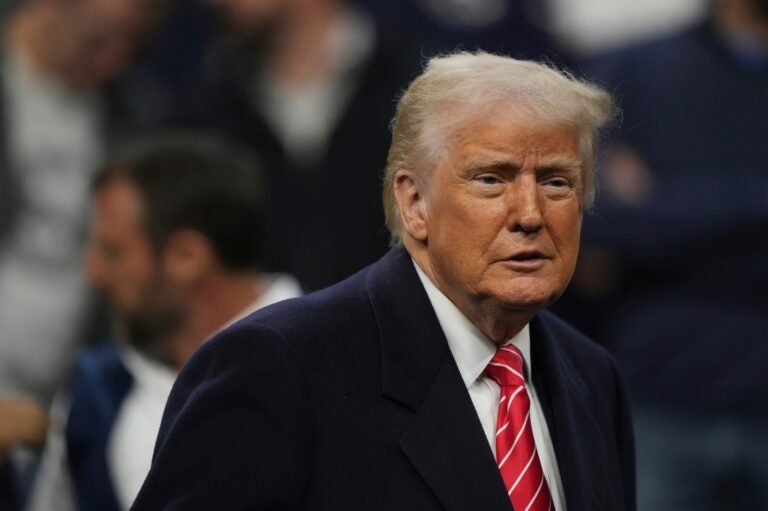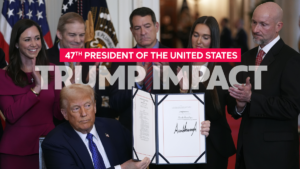Trump’s 3rd Circuit: President has power to remake Philly region’s highest federal court
With two vacancies, the 3rd Circuit, a highly influential and powerful court, is evenly split between Democrat- and Republican-appointed judges.
Listen 0:54
President Donald Trump attends the finals at the NCAA wrestling championship, Saturday, March 22, 2025, in Philadelphia. (AP Photo/Matt Rourke)
From Philly and the Pa. suburbs to South Jersey and Delaware, what would you like WHYY News to cover? Let us know!
The U.S. Court of Appeals for the 3rd Circuit — which hears pivotal cases from Pennsylvania, New Jersey and Delaware — is operating with two vacant judgeships, a notable absence on a 14-seat court that often rules on some of the nation’s most pressing legal issues.
The president of the United States has the authority to make nominations to the court to the U.S. Senate, which can confirm or reject them. However, President Donald Trump’s history of federal bench appointments and the Republican control of Congress has Democrats and other court watchers concerned that he could upend the direction of the judicial body that makes precedential decisions for the region and often influences the rest of the country.
“It’s a critical court,” Sen. Chris Coons, D-Del., told WHYY News. “There is a real risk that the Trump administration will nominate someone who is well outside the judicial mainstream, not just a conservative.”
What is the Third Circuit Court of Appeals?
There are 11 regional circuit courts in the federal judiciary, as well as the District of Columbia Circuit, which covers only Washington, and the Federal Circuit, which hears cases from across the country that involve specialized areas of law. Federal circuit courts are appellate courts and hear cases on appeal from lower federal courts and state cases courts when a federal issue is in question, such as a constitutional or civil rights issue.
Unlike the U.S. Supreme Court, which can be selective, choosing only a handful of the petitions they receive for review, circuit courts must hear every qualified case they receive.
“The Supreme Court takes very, very few cases, maybe 100 a year out of thousands that they’re asked to review,” explained David Rudovsky, a civil rights and criminal defense attorney and a senior fellow at the University of Pennsylvania’s Carey Law School. “So oftentimes the Court of Appeals is the final word for that section of the country on particular issues.”
Cases that do reach the 3rd Circuit are typically heard by a panel of three circuit judges but unsatisfied parties can appeal to the full court which, in the case of the 3rd Circuit, usually consists of 14 judges.
Circuit courts handle appeals regarding many areas of law — including criminal, civil, election and corporate — to determine if the law was correctly interpreted and applied by the lower court.
The 3rd Circuit’s two vacancies are the result of recent retirements. Judge Joseph Greenaway, an appointee of Democratic President Barack Obama, retired from the bench in June of 2023. Republican President George W. Bush-appointed Judge Kent Jordan retired in January of this year.
Last January, President Joe Biden attempted to replace Greenaway, nominating Adeel Mangi of New Jersey, who would have been the nation’s first Muslim federal appeals court judge. However, Republicans stalled his confirmation hearing for months and, shortly after the election in November, negotiated a deal with Democrats that effectively blocked Mangi and three other of Biden’s circuit court judge nominees.
Election law and the 3rd Circuit
One reason court watchers see the 3rd Circuit as “critical” is because of Pennsylvania’s perennial distinction as a major swing state with the potential to solely determine a presidential election, which has led to many legal challenges over election law.
“Pennsylvania was one of the most litigious states in the entire country as it related to the 2020 election results and election administration,” said Kadida Kenner, CEO of the New Pennsylvania Project and co-chair of Why Courts Matter – Pennsylvania. “And it was our circuit courts, and our federal district courts in Pennsylvania that were making judgments about our provisional ballots, whether they should count or not and the legitimacy of our elections.”
For example, after the 2020 election, the Trump campaign filed a federal lawsuit against election officials in Pennsylvania to have millions of votes thrown out in one of many efforts to overturn election results around the country. The Trump campaign appealed a federal district court decision up to the 3rd Circuit, which ruled the campaign’s claims had “no merit.”
“That was very impactful for the 2020 election, particularly as the world waited on the results coming out of Pennsylvania,” Kenner said. “All attention will be back onto Pennsylvania here in 2025 and 2026 and beyond about how our elections are being carried out and how the courts are making determinations about that.”
Corporate law and the 3rd Circuit
More than 2.2 million businesses, including two-thirds of Fortune 500 companies, are incorporated in Delaware, giving one of the nation’s smallest states the largest corporate presence in the country.
Generally, corporate law is adjudicated at the state level, but cases involving certain issues — such as securities regulation, bankruptcy and intellectual property — are usually taken up by federal courts. Federal courts are also common venues for civil lawsuits regarding a host of complaints.
“Securities cases can come through Delaware cases against corporations for false statements in connection with securities offerings or initial public offerings,” said Lou Maffa, a practicing appellate litigator and professor at the University of Delaware in the Lerner College of Business and Economics. “You can have significant precedent coming out of the 3rd Circuit in that major area. You also have significant precedent coming out of the 3rd Circuit in the area of federal trade secrets law.”
Maffa explains that federal court judges from the region, therefore, have a sophisticated understanding of complex corporate legal issues, having developed experience in that area. For that reason, he said that “most of the judges in the 3rd Circuit come out of the district court level primarily, or they come from the business world or the U.S. attorney’s office.”
“Delaware corporate law ends up being decisive for lots and lots of major corporate decisions,” Coons added. “That goes through often the Delaware Supreme Court and occasionally through the Delaware Federal District Court up to the 3rd Circuit. Also, Delaware’s district court is one of the busiest in the country for patent cases. And our federal bankruptcy court is one of the busiest in the country for complex bankruptcy cases.”
Filling the vacancies
The 3rd Circuit is currently composed of six Democrat-appointed and six Republican-appointed judges, four of which were selected by Trump in his first term. The two vacancies give him the opportunity to significantly change the judicial direction of the court for years.
Although there is no mandate that specific seats be reserved for nominees from particular states, presidents have, by custom, nominated judges from the same states as their predecessors to maintain a balance of representation. If that tradition continues, Trump will nominate one judge from New Jersey and one from Delaware.
The nomination process has also traditionally been conducted with advice from the U.S. senators in those states, who would make their own recommendations. However, both states are fully represented in the Senate by Democrats, who will likely diverge from the president on their choices.
“When you have different political parties between the states and the administration, it gets a little more interesting because the president can appoint and nominate anybody the president wants, and it’s up to the Senate to confirm them,” Maffa said.
Unlike the past when such nominations required a 60-vote supermajority, the president now only needs a simple majority, a change made during the Obama administration.
Trump “now has control of the Senate and so probably a very good chance that whoever he appoints, at least in the next two years while he’s got the Senate, will be confirmed,” Rudovsky added.
Trump’s trials
Without any candidates so far, it’s impossible to say what direction the president will go, but past appointments may offer clues.
“I would expect those judges we will see him appoint here in the 3rd Circuit to be very conservative in terms of doctrine and judicial philosophy,” Rudovsky said.
Trump’s appointments to the U.S. Supreme Court, for example, all voted to effectively end a 50-year-old national right for a woman to obtain an abortion.
However, there are also concerns whether his appointments will go even beyond conservative legal thought and put the president above the law, as they did when they gave then-former President Trump immunity from prosecution and convictions for crimes committed during his presidency.
“The conservatives [on the Supreme Court] gave him a very broad immunity and the liberals dissented,” Rudovsky said. “So I think those are all clear signs of the difference in philosophy of those justices. And then the same for judges on the courts of appeals. I think it’s fairly predictable as to the type of judge he would appoint.”
However, former appointees have, at times, also ruled against the president. For example, in another 2020 election case, Texas, in conjunction with the Trump campaign, sued Pennsylvania and other swing states in an effort to subvert the election. Trump-appointed Justices Neil Gorsuch, Brett Kavanaugh and Amy Coney Barrett all joined a decision dismissing the case.
In the earlier mentioned 2020 Pennsylvania election case, 3rd Circuit Court Judge Stephanos Bibas, a Trump appointee, authored a unanimous decision rejecting the Trump campaign’s claims, writing that “calling an election unfair does not make it so.”
“Trump lost a lot of those challenges in 2020 after that election because he was making such false claims that even Republican judges voted against him,” Rudovsky said. “So there’s that kind of check and balance, but you never know with different judges what you might get. [It’s] very hard to predict.”
The qualified
All those who talked to WHYY News said that they hoped that, regardless of their judicial philosophies, whoever Trump nominates would be qualified, but what qualifies as qualified varies some.
“You want people that are open to hearing arguments and hearing cases and deciding the cases on the merits and the arguments presented, not because of their personal bias or preferences,” Maffa said. “Most lawyers and judges wouldn’t want someone who comes to the court with an agenda, so you don’t really want people who are ideologically bent and unwavering.”
Kenner agrees, adding “What makes someone qualified to do this job is someone who can look at the Constitution and make determinations based upon the constitutionality and not their own political leanings or the fact that they lack understanding of normal everyday people.”
That, however, means seeking people with “professional diversity.”
“Diversity on the bench is absolutely necessary for people to feel as though the courts are fair,” she said. “It’s important for judges to come from places other than corporate law. It’s nice to have public defenders on benches. It’s great to have people who have different lived experiences determining or interpreting the Constitution and providing decisions, not only just the entire commonwealth, since decisions made in the 3rd Circuit go beyond just our region.”
Coons, however, said — given the power Republicans have at the moment — he is mostly hoping to simply mitigate the potential damage he believes Trump nominees might bring.
“We could slow it down, but we can’t actually block someone getting on a circuit court at this point,” Coons said. “It’s possible that we could find an understanding whereby I would end up supporting someone who may be more conservative than me, but who I don’t view as destructive.”
WHYY is your source for fact-based, in-depth journalism and information. As a nonprofit organization, we rely on financial support from readers like you. Please give today.







